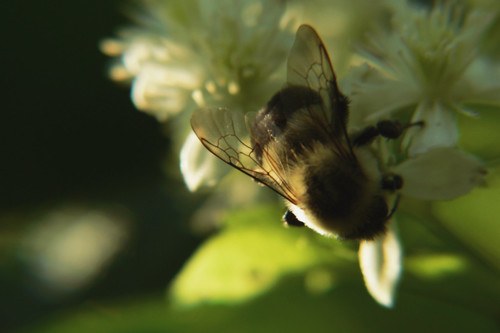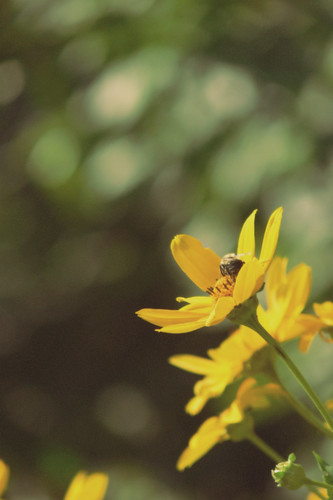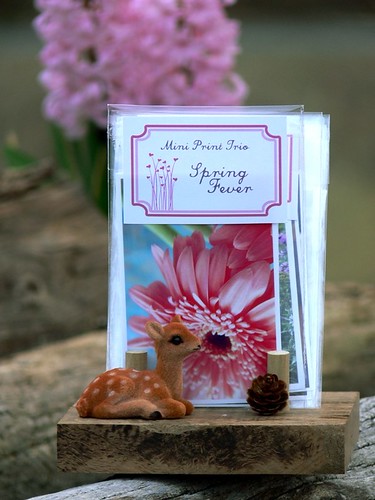
Did you know that pollinators are necessary for the reproduction of 90% of our flowering plants and that nearly one third of the human diet comes from insect-pollinated plants?
The US department of Agriculture states that the honeybee is responsible for nearly 80% of that pollination. A common misconception is that honeybees only produce honey when in fact they pollinate more than 90 different varieties of the most flavorful flowering crops we have. To name a few, blueberries, broccoli, apples, almonds, avocados, soybeans, celery, cucumbers, peaches, cherries, cranberries, and strawberries. Without the "busy bees" these crops and many others are not able to grow.
A congressional study estimates that honeybees add almost $15 billion dollars a year in value to our food supply.Unfortunately, the number of bee populations are on the decline. They are severly being threatened by a multitude of factors including, habitat loss, disease, and the excessive and inappropriate use of pestisides. Scienctist have yet to pinpoint a singular culprit in this myterious, bee disappearing phenomenon, but rest assured that many theories are currently being explored. In the interim, this complex combination of elements have been given a name, Colony Collapse Disorder or CCD.
Because bees play a pivotal role in providing us with a wide array of foods, they have become essential to producing most of what ends up on our plates. Without the bees, our favorite fruits and veggies, chock full o' vitamins, may become scarce and almost impossible to obtain.
"If bees continue to disappear at the current rate the honeybee population in the United States will cease to exist by the year 2035"
Protecting our honeybees is crucial and you can "bee involved".
By taking steps to help the pollinator populations flourish we can support their need for habitat while supporting our own needs for food and at the same time diversity in natural ecosystems. Making a difference to both pollinators and the people that rely upon them can be as easy as adding local and native plants to your landscape that offer food and shelter for pollinators throughout their active seasons. To help you get started, Pollinator.org offers some very in depth planting guides according to your region. It's as easy a punching in your zip code!

Learning about bees and other pollinators can teach us more about the important role they play in our environment. And I strongly encourage you to take some time to do so, especially if this is the first you are hearing about Colony Collapse Disorder. Recently, Cody and I watched a PBS documentary called, "Silence of the Bees" and it really opened my eyes to the potential devastation that this can cause. If you also want to be fully informed I recommend taking some time to watch that fascinating episode--you won't be sorry.
Here is a clip. Follow the above link to see the full episode.
Increasing awareness about this unexplained reality is hugely important to me and I thought that there was no better time to do it than before spring hits. It gives you plenty of time to do a little independent research in helping to create and maintain pollinator friendly landscapes in and around your own homes. Cody and I are really lucky in the sense that our yard and surrounding valley is already a lush landscape of biodiversity. Throughout the year, flowers and fruits thrive in ways that continue to amaze and captivate me. I know not everyone is as blessed to live in such an environment, but it is possible to establish pollinator friendly plants in pots given you have some sort of outdoor space available. You're all creative individuals, I'm betting that you can come up with something!
Since this has been in the forefront of my mind for quite some time, I have decided to donate 10% of every mini print trio ordered to NAPPC to help fund research for Colony Collapse Disorder. Living without honeybees is not something I want to imagine, and I hope that you will feel the same.

click on photo to go to my etsy shop.


I took a biology class at school last quarter and we talked a lot about the diminishing honey bee population. I am glad that other people are starting to become concerned for the cause!
ReplyDeleteThis has been going on for a while now with no end in sight. It is kind of scary.
ReplyDeleteWow, I had no idea about this. What an interesting post. I'd like to see the rest of that documentary, too.
ReplyDeleteI hope you recognize what a generous person you are. I am so proud to know you.
ReplyDeleteI was going to post about this myself next week as we are having to same problem here in the UK and Europe. Thanks for raising awareness.
ReplyDeleteThis is so scary to me. I keep reading things about the disappearing bees and it's really frightening. Thanks for spreading the word. I hope they find some more solutions to this issue soon!!
ReplyDeleteyou are inspiring action in so many different ways ...blessings ELK
ReplyDeleteI just watched a news report on this and scheduled a post for next week... with the same Burt's bees video. :) Everything to get the word out is good! Wonderful post!
ReplyDeletefirst, you are a nice person, second, my sister appears also to be a nice person, given her comment, and christine, who commented right before, she is sensational because....she schedules her blogs. do you think i am in a rut? i don't feel so bad about being lazy about stuff like this, A. is a climate change expert and i give him up every day! xo
ReplyDeletefirst, you are a nice person, second, my sister appears also to be a nice person, given her comment, and christine, who commented right before, she is sensational because....she schedules her blogs. do you think i am in a rut? i don't feel so bad about being lazy about stuff like this, A. is a climate change expert and i give him up every day! xo
ReplyDeleteThis is a very interesting post, I enjoyed reading it and no I did not know we had a decline in bee population. I would hate to see a decline in fruits and veggies. Thanks for the link.
ReplyDeleteThat first photo is GORGEOUS! Bees are so pretty!
ReplyDeleteI need to plant some flowers anyway - I would love to help as I love watching bees at work. thanks for sharing this information.
ReplyDeleteThanks for this. It's important work you're doing!
ReplyDeleteI posted about the honey bee plight last summer. Haagen Daz has kind of a fun and informative website devoted to the problem:
ReplyDeletehttp://www.helpthehoneybees.com/
I'm so glad to see this post. Awareness of CCD must be heightened as there's great cause for alarm. I sure hope the schools/universities are teaching about this. What do we think we'll do for natural foods if the honey bees disappeared? Last summer every time I saw a honey bee it was cause for celebration. Now, with the assistance of the links you provided, THIS summer I'll be more active on behalf of the bees.
ReplyDeleteEat Ben & Jerry's ice cream if you're going to have a snack. They contribute part of their funds to the cause.....
Tell everyone to *stop using* pesticides in their yards and on their lawns. !!!
Bees are very important. We have friends who are bee farmers, Troy worked for them a while back and my parents helped haul them.
ReplyDeleteI think there are some varieties of Haagen Daaz (or some other brand of ice cream) that talk about bees and donate money towards them. I think I shall go and buy a few pints this weekend. ;)
ReplyDeletethank you for caring. i support such initiatives here in south africa.
ReplyDeletethanks for this post. there was recently an article in the new york times that suggested that some bee populations are dying because they are being fed corn syrup. what a crazy world!
ReplyDeleteGreat information! I have known about this for sometime but did'nt know I could actually do something to help. I put your link on my blog also.
ReplyDeleteCarol
It truly is frightening. I noticed a few years ago that bees were starting to dissapear when I would be out in the yard.
ReplyDeleterue
Thanks for bringing awareness to this issue. There are so many things in nature we take for granted that would be catastrophic if they disappeared.
ReplyDeleteMuch of the problem stems from our trying to fix one problem without consideration of what else we might impact. Pesticides kill (for a while) unwanted pests but also beneficial species.
We have a responsibility to future generations to act on this and many other issues.
Namaste,
Roger